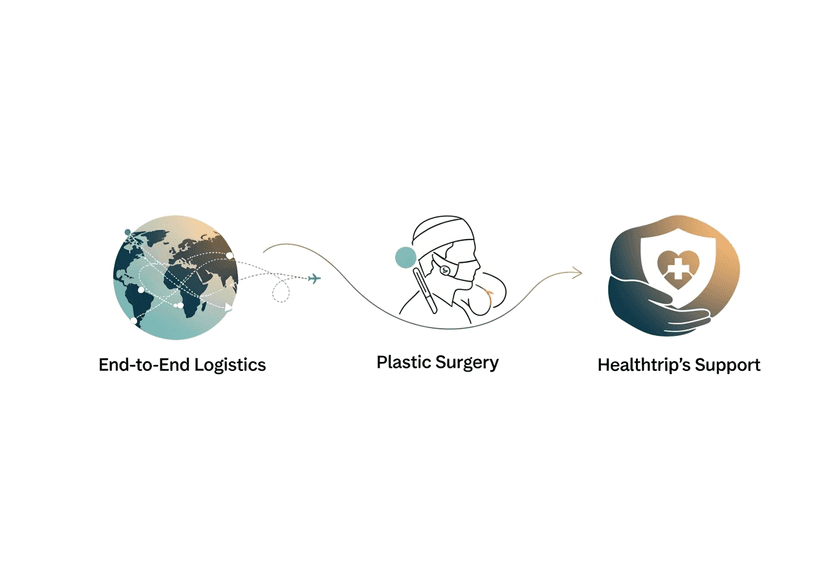
Role of Multidisciplinary Teams in Plastic Surgery
15 Oct, 2025
 Healthtrip
Healthtrip- Where are Multidisciplinary Teams Commonly Used in Plastic Surgery? < li>Why are Multidisciplinary Teams Important in Plastic Surgery? < li>Who Makes Up a Multidisciplinary Team in Plastic Surgery?
- How Do Multidisciplinary Teams Function in Plastic Surgery?
- Examples of Multidisciplinary Teams in Plastic Surgery and Associated Hospitals
- Benefits of Multidisciplinary Teams for Patients
- Conclusion
Understanding Multidisciplinary Teams
A multidisciplinary team in plastic surgery consists of professionals from various specialties working together to provide comprehensive patient care. This typically includes plastic surgeons, nurses, anesthetists, psychologists, physical therapists, and other specialists as needed. For instance, a patient undergoing breast reconstruction at Memorial Sisli Hospital after a mastectomy might benefit from the expertise of a surgical oncologist, a plastic surgeon specializing in reconstruction, a psychologist to address emotional well-being, and a physical therapist to aid in regaining mobility. Each member brings a unique perspective, contributing to a holistic treatment plan tailored to the individual's needs. This way, the team can address not only the physical aspects of the surgery but also the psychological and emotional challenges that patients often face. It's like having a group of detectives solving a complex case, where each detective brings a unique skill set to uncover the truth.
Most popular procedures in India
Benefits of Multidisciplinary Teams in Plastic Surgery
The advantages of a multidisciplinary approach are manifold. Improved patient outcomes are a key benefit, as the combined expertise leads to more accurate diagnoses and more effective treatment plans. Consider a child born with a cleft lip and palate; a multidisciplinary team including plastic surgeons, orthodontists, speech therapists, and audiologists can collaborate to create a comprehensive treatment plan addressing both the functional and aesthetic aspects of the condition. This collaborative effort ensures better speech development, improved facial aesthetics, and enhanced overall quality of life for the child. Furthermore, better communication among team members streamlines the treatment process, reducing the risk of errors and ensuring that patients receive consistent and coordinated care. This is particularly crucial for complex cases requiring multiple procedures or therapies. At Healthtrip, we understand how overwhelming navigating medical complexities can be, and multidisciplinary teams can ease that burden.
Key Roles within the Multidisciplinary Team
Each member of the multidisciplinary team plays a crucial role in ensuring the success of the treatment. The plastic surgeon takes the lead in surgical planning and execution, while nurses provide essential pre- and post-operative care, monitoring the patient's recovery and administering medications, often as they do at Yanhee International Hospital. Anesthetists ensure patient comfort and safety during surgery, while psychologists offer support to address emotional distress and improve coping mechanisms. Physical therapists, on the other hand, help patients regain strength and mobility after surgery. Other specialists, such as occupational therapists and social workers, may be involved depending on the specific needs of the patient. For example, a patient undergoing facial reconstruction after trauma may benefit from the expertise of an occupational therapist to regain fine motor skills and a social worker to address psychosocial issues. It’s like an orchestra, where the plastic surgeon is the conductor, and each specialist plays their instrument to create a harmonious symphony of healing.
Wellness Treatments
Give yourself the time to relax
Lowest Prices Guaranteed!

Lowest Prices Guaranteed!
Examples of Successful Multidisciplinary Approaches
Numerous examples demonstrate the effectiveness of multidisciplinary teams in plastic surgery. In breast reconstruction, a team approach involving surgical oncologists, plastic surgeons, and radiation oncologists can optimize treatment outcomes and improve patient satisfaction. For instance, at Fortis Memorial Research Institute, Gurgaon, patients undergoing breast cancer treatment benefit from a coordinated approach that integrates surgery, radiation therapy, and reconstructive surgery. Similarly, in the treatment of burn victims, a multidisciplinary team consisting of plastic surgeons, nurses, physical therapists, and psychologists can provide comprehensive care to address both the physical and emotional scars of the trauma. This holistic approach not only improves the patient's physical recovery but also enhances their psychological well-being and reintegration into society. These success stories highlight the importance of collaboration and communication in achieving optimal results.
Challenges and How to Overcome Them
Despite the numerous benefits, implementing a multidisciplinary approach in plastic surgery is not without its challenges. Communication barriers, conflicting opinions, and logistical difficulties can hinder the effectiveness of the team. To overcome these challenges, it is essential to establish clear communication protocols, foster a culture of mutual respect and collaboration, and ensure that all team members have a shared understanding of the treatment goals. Regular team meetings, case conferences, and standardized documentation can facilitate communication and coordination. Additionally, investing in training programs to enhance teamwork skills and promote interprofessional collaboration can improve team dynamics and patient outcomes. Healthtrip aims to bridge communication gaps by providing comprehensive information and support to patients and their families, ensuring that everyone is on the same page throughout the treatment journey. After all, a problem shared is a problem halved, especially when it comes to healthcare.
Where are Multidisciplinary Teams Commonly Used in Plastic Surgery?
Multidisciplinary teams in plastic surgery are becoming increasingly essential across various healthcare settings, offering comprehensive and coordinated care for patients. They are commonly found in major hospitals and specialized clinics that offer a wide array of plastic and reconstructive procedures. These teams thrive in environments where the complexity of cases requires diverse expertise and collaborative decision-making. For example, comprehensive cancer centers often utilize multidisciplinary teams for patients undergoing reconstructive surgery following cancer removal. These teams ensure that the aesthetic and functional outcomes are optimized, providing holistic support throughout the patient's journey. Academic medical centers, with their focus on research and training, heavily rely on multidisciplinary teams to advance the field of plastic surgery. These teams not only deliver top-notch patient care but also contribute to innovations and improvements in surgical techniques. You might find such teams at institutions like Fortis Memorial Research Institute, Gurgaon, where diverse specialists collaborate to address complex reconstructive needs. At Saudi German Hospital Cairo, Egypt, integrating various specialists ensures that patients receive coordinated and comprehensive care plans tailored to their unique needs, which is something Healthtrip can help you arrange.
Furthermore, multidisciplinary teams are crucial in specialized burn units where patients often require extensive and prolonged care. These teams coordinate the efforts of surgeons, nurses, physical therapists, and psychologists to manage both the physical and emotional trauma associated with burn injuries. Pediatric hospitals also frequently employ multidisciplinary teams to address congenital deformities and injuries in children. These teams provide age-appropriate care, ensuring that the unique needs of young patients are met with compassion and expertise. Centers specializing in craniofacial surgery, such as those focusing on cleft lip and palate repair, depend on these collaborative approaches to achieve the best possible outcomes. Moreover, cosmetic surgery clinics are increasingly adopting multidisciplinary models to offer comprehensive pre- and post-operative care, ensuring patient satisfaction and safety. These teams might include plastic surgeons, dermatologists, nutritionists, and mental health professionals who work together to enhance the overall patient experience. Wherever complex medical needs intersect with aesthetic goals, multidisciplinary teams are stepping up to provide a more integrated and effective approach to plastic surgery. Through Healthtrip, you can find and connect with facilities like these, ensuring you receive well-rounded care.
Why are Multidisciplinary Teams Important in Plastic Surgery?
The importance of multidisciplinary teams in plastic surgery stems from the multifaceted nature of the field, which often involves complex medical, functional, and aesthetic considerations. Plastic surgery is not just about improving appearance; it frequently plays a crucial role in restoring function, correcting deformities, and enhancing the overall quality of life for patients. This complexity demands a collaborative approach where different specialists bring their unique skills and knowledge to the table. Imagine a patient undergoing breast reconstruction after a mastectomy. A multidisciplinary team ensures that the surgical reconstruction is coordinated with oncological treatment, radiation therapy, and psychological support. This coordinated approach optimizes the patient's physical and emotional recovery, leading to better outcomes and a more positive experience. Without such collaboration, critical aspects of care might be overlooked, potentially compromising the patient's well-being. Healthtrip understands the value of comprehensive care, and we can help you find medical facilities that prioritize a team-based approach, ensuring you receive the best possible treatment.
Moreover, multidisciplinary teams are essential for managing patients with complex conditions such as severe trauma, burns, or congenital anomalies. These conditions often require a combination of surgical interventions, wound care, physical therapy, and psychological support. Each specialist contributes to a comprehensive treatment plan that addresses all aspects of the patient's needs. For instance, in the case of a severe burn injury, a plastic surgeon might collaborate with a wound care specialist to promote healing, a physical therapist to restore mobility, and a psychologist to address the emotional trauma. This collaborative effort ensures that the patient receives holistic care, leading to better functional and aesthetic outcomes. Additionally, multidisciplinary teams enhance patient safety by reducing the risk of errors and complications. By involving multiple experts in the decision-making process, potential issues can be identified and addressed proactively. Communication and coordination among team members are crucial for ensuring that all aspects of the patient's care are aligned and integrated. By promoting a team-based approach, plastic surgery practices can deliver more effective, efficient, and patient-centered care. Consider facilities like Fortis Hospital, Noida, where diverse medical professionals work together to provide comprehensive treatments - Healthtrip can assist in connecting you with such integrated care environments.
Who Makes Up a Multidisciplinary Team in Plastic Surgery?
A multidisciplinary team in plastic surgery is composed of a variety of healthcare professionals, each bringing their specialized expertise to the patient's care. The core of the team typically includes the plastic surgeon, who leads the surgical planning and execution. However, the team extends far beyond just the surgeon, encompassing a range of specialists who contribute to different aspects of the patient's treatment journey. One crucial member is the reconstructive surgeon, who specializes in restoring form and function after trauma, surgery, or congenital disabilities. They often work closely with oncologists to reconstruct areas affected by cancer, such as the breast or face. Another key player is the specialized nurse, who provides essential pre- and post-operative care, monitoring the patient's recovery and ensuring their comfort. Skilled nurses are adept at wound care, pain management, and patient education, playing a vital role in the healing process. At facilities like Saudi German Hospital Dammam, you'll find dedicated nursing staff working alongside surgeons. Healthtrip can help you find hospitals renowned for their comprehensive nursing care.
Furthermore, the team often includes other medical specialists such as dermatologists, who can help manage skin conditions and optimize skin health before and after surgery. Physical therapists are critical for restoring mobility and function, especially after reconstructive procedures or trauma. They design individualized exercise programs to improve strength, flexibility, and range of motion. Psychologists or counselors offer emotional support to patients, helping them cope with the psychological impact of surgery or trauma. This is particularly important for patients undergoing reconstructive surgery after cancer or dealing with body image issues. Nutritionists provide dietary guidance to ensure patients receive the nutrients they need for optimal healing and recovery. They can help patients manage their weight, improve their overall health, and support wound healing. Additionally, depending on the specific needs of the patient, the team may also include specialists such as speech therapists, occupational therapists, prosthetists, and social workers. Each member contributes their unique skills and knowledge to create a comprehensive and individualized treatment plan, ensuring the best possible outcome for the patient. Hospitals like Vejthani Hospital often integrate these various specialists to ensure well-rounded patient care, which is something Healthtrip can facilitate.
Also Read:
How Do Multidisciplinary Teams Function in Plastic Surgery?
Imagine a symphony orchestra, each musician contributing their unique skill to create a harmonious masterpiece. That's essentially how a multidisciplinary team in plastic surgery operates! It's not just about one surgeon calling all the shots; it's a collaborative effort where each member, from the surgeon to the psychologist, brings their expertise to the table. Before, during, and after a procedure, these professionals work together to ensure the patient receives the best possible care, both physically and emotionally. The process typically begins with a comprehensive assessment where each specialist evaluates the patient from their specific perspective. This initial assessment forms the basis for a tailored treatment plan designed to address all aspects of the patient's well-being. Regular team meetings become a cornerstone of the process, providing a platform for sharing insights, discussing progress, and making necessary adjustments to the treatment strategy. This collaborative approach ensures that nothing is overlooked and that the patient benefits from the collective wisdom of the entire team. It's about holistic care, and that really makes a difference when you're trusting someone with your health and appearance.
Communication is absolutely key to the success of a multidisciplinary team. This isn't just casual chitchat; it’s structured, efficient, and focused. Think of it as a well-oiled machine where information flows seamlessly between team members, ensuring everyone is on the same page. This is also where Healthtrip can significantly help, by offering patients a platform to easily communicate with different specialists involved in their case, upload medical records, and keep track of all the consultations and recommendations in one place. Clear communication minimizes the risk of misunderstandings, reduces errors, and allows for a more coordinated and effective approach to patient care. Furthermore, the patient is actively involved in the decision-making process. Their preferences, concerns, and goals are not just acknowledged but are integrated into the treatment plan. It's a shared journey, where the patient feels empowered and supported, knowing that they are at the heart of the entire process. This patient-centered approach enhances satisfaction and promotes better outcomes, turning what could be a stressful experience into a collaborative partnership focused on achieving the best possible results.
Also Read:
Examples of Multidisciplinary Teams in Plastic Surgery and Associated Hospitals
Let's dive into some concrete examples to illustrate how multidisciplinary teams are applied in real-world plastic surgery settings. Consider reconstructive surgery following cancer treatment. In this scenario, a multidisciplinary team might include a plastic surgeon specializing in reconstruction, an oncologist overseeing the cancer treatment, a radiation therapist managing radiation therapy, a psychologist addressing emotional well-being, and a physical therapist aiding in rehabilitation. Fortis Memorial Research Institute, Gurgaon, utilizes such teams to offer comprehensive care to cancer survivors, ensuring not only the physical reconstruction but also the emotional and functional recovery of the patient. Similarly, in cases of severe burns, a burn surgeon, a wound care specialist, a nutritionist, a pain management specialist, and a psychiatrist might collaborate to provide holistic care. The Singapore General Hospital is known for its multidisciplinary burn unit, where patients receive comprehensive treatment addressing both the physical trauma and the psychological impact of burn injuries. These teams work in tandem to manage pain, prevent infections, optimize nutrition, and facilitate the long and often challenging rehabilitation process.
Another compelling example lies in the treatment of congenital deformities such as cleft lip and palate. These complex conditions necessitate the expertise of a plastic surgeon, an oral and maxillofacial surgeon, a speech therapist, an audiologist, and a pediatric dentist. Together, they create a coordinated treatment plan that addresses the functional, aesthetic, and speech-related challenges associated with these deformities. Bangkok Hospital, renowned for its comprehensive pediatric services, employs multidisciplinary teams to manage cleft lip and palate from infancy through adolescence, ensuring optimal outcomes and improved quality of life for these young patients. Moreover, even in cosmetic procedures, multidisciplinary teams can play a valuable role. For instance, in facial rejuvenation, a dermatologist, a plastic surgeon, and an aesthetician might collaborate to develop a personalized treatment plan that combines surgical and non-surgical techniques to achieve natural-looking results. Cleveland Clinic London often integrates dermatologists and plastic surgeons to provide comprehensive facial rejuvenation plans. The key takeaway is that multidisciplinary teams are not limited to complex cases; they can enhance the quality and outcomes of a wide range of plastic surgery procedures by addressing the multifaceted needs of each patient.
Also Read:
Benefits of Multidisciplinary Teams for Patients
The benefits of multidisciplinary teams in plastic surgery are vast and profound, ultimately leading to improved patient outcomes and a more positive experience. One of the primary advantages is the enhanced quality of care. When various specialists collaborate, they bring their unique perspectives and expertise to the table, resulting in a more comprehensive and well-rounded treatment plan. This collaborative approach minimizes the risk of overlooking important aspects of the patient's condition and ensures that all needs are addressed. For example, at Memorial Sisli Hospital, the use of multidisciplinary teams in reconstructive surgery has led to higher success rates and improved patient satisfaction, according to internal studies. Another significant benefit is the reduction of complications. By involving multiple specialists in the planning and execution of a procedure, potential risks and complications can be identified and mitigated proactively. This proactive approach can lead to fewer post-operative issues and a smoother recovery process for the patient.
Furthermore, multidisciplinary teams often result in shorter hospital stays. A coordinated and efficient treatment plan can streamline the recovery process, allowing patients to return home sooner and resume their normal lives. This not only improves the patient's quality of life but also reduces healthcare costs. The NMC Specialty Hospital, Al Nahda, Dubai, has seen a significant reduction in average hospital stay for patients undergoing complex plastic surgery procedures, thanks to its integrated multidisciplinary approach. Beyond the physical benefits, multidisciplinary teams also address the emotional and psychological well-being of patients. Plastic surgery can be a deeply personal and emotional experience, and having access to mental health professionals can provide invaluable support and guidance. This holistic approach recognizes that healing involves more than just physical recovery; it also requires addressing the emotional and psychological impact of the procedure. Ultimately, multidisciplinary teams empower patients to make informed decisions about their care. By providing clear and comprehensive information from various experts, patients can actively participate in the decision-making process and feel more confident and in control of their treatment. It's about providing compassionate, comprehensive, and coordinated care that puts the patient at the center.
Also Read:
Conclusion
In conclusion, multidisciplinary teams represent a paradigm shift in plastic surgery, moving away from a siloed approach to a collaborative model that prioritizes the patient's overall well-being. By bringing together diverse specialists, these teams offer a more comprehensive, coordinated, and effective approach to care. The benefits are undeniable, ranging from enhanced quality of care and reduced complications to shorter hospital stays and improved patient satisfaction. As healthcare continues to evolve, the importance of multidisciplinary teams will only grow, shaping the future of plastic surgery and transforming the patient experience. Healthtrip is committed to facilitating access to these comprehensive care models, connecting patients with hospitals like Fortis Memorial Research Institute and Singapore General Hospital, which are renowned for their multidisciplinary approach. If you're considering plastic surgery, remember that the best possible care often involves a team of experts working together to help you achieve your goals and improve your quality of life. It's not just about changing your appearance; it's about enhancing your overall well-being, and a multidisciplinary team is your best partner in that journey.
Related Blogs

Latest Techniques Used for Eye Surgery in India via Healthtrip
Detailed guide on eye surgery, featuring doctors, hospitals, risks, recovery,

Healthtrip's Process for Booking Your Eye Surgery in India
Detailed guide on eye surgery, featuring doctors, hospitals, risks, recovery,

Best Doctors for Eye Surgery in Top Healthtrip Hospitals
Detailed guide on eye surgery, featuring doctors, hospitals, risks, recovery,

How Healthtrip Ensures Quality & Safety in Plastic Surgery Procedures
Detailed guide on plastic surgery, featuring doctors, hospitals, risks, recovery,

End-to-End Logistics for Plastic Surgery with Healthtrip's Support
Detailed guide on plastic surgery, featuring doctors, hospitals, risks, recovery,

Healthtrip's Care Coordinators: Your Support During Plastic Surgery
Detailed guide on plastic surgery, featuring doctors, hospitals, risks, recovery,










